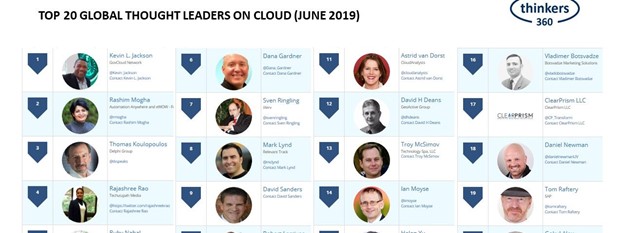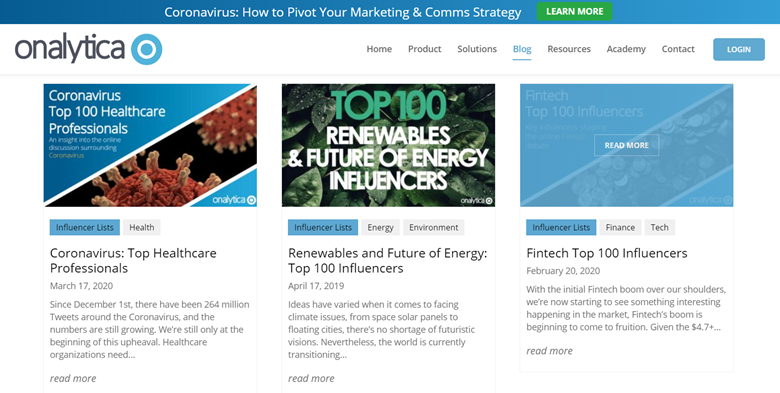In Part 1 of this series, I showed you the real challenges most B2B companies face, who the influencers are and how they’re different than their consumer counterparts.
Also, I showed you how they can be applied to drive up your brand visibility, bring in leads, and even push your competitors out of the way.
In part 2, I’ll show you ways to work with influencers so you can develop top quality content, drive up awareness for your brand, and generate leads.
Know your objective
Before you do anything else, know your objective and why you want to work with influencers.
If you’re not sure, here are some main reasons companies work with influencers.
Do any of these make sense with you?
- Raise brand awareness
- To stand apart from your competition
- Get more followers on social media
- Elevate your company thought leadership
- Expand your business footprint outside of your niche
- Get sales leads
Having clear objectives gives you the necessary roadmap to establish clear KPIs so you measure the success of your campaign
How to work with influencers
Working with influencers is only limited by your own imagination and creativity.
Many are keen to work with companies like yours but often don’t know how to approach you.
They are willing to speak at your events, co-create content with you, advise and more.
The Trouble is many companies don’t have a clue either.
Therefore, here are some quick and easy ways you can work with influencers.
1: The expert roundup
This kind of content is where you reach out to niche experts to ask for their direct contribution.
It’s simple to develop because a lot of the content comes from the influencers themselves.
Your only work is copying and pasting it and maybe fixing some typos to dress it up. It doesn’t take a lot of time or effort.
Yet, the best part is the benefits:
- Boosts your brand awareness because they have a vested interest in promoting your post
- Your brand is seen as being aligned with industry authorities and thought leaders
- Opens the door to build a relationship with them
But it also benefits the influencers:
- The post promotes a link to their profile or website
- Elevates their position as an authority figure
- The get SEO juice to their website
- They have an opportunity to work with you further
Here’s how to get started…
Simply pick an interesting topic and reach out to select influencers to provide their insights or predictions.
Be clear. Tell them you are writing an expert roundup and you would like them to provide a few thoughts on a specific topic.
Their responses may be a couple of sentences or an entire paragraph.
Once you’ve collected all their content, place it into the blog post, and publish it.
Once you publish, be sure to let the influencers know so they can help you promote it.
2: Podcast Guest
Podcasts are a great way to get your spokespeople exposure and build traction as thought leaders. They also drive brand awareness.
Here’s how you do it:
Find podcasts in your business niche and reach out to them about getting your spokesperson on as a guest.
When reaching out, be sure to let them know you listen to their podcast and why you believe their audience would benefit by having your spokesperson on as a guest. Be sure to reference episodes that you find especially good or helpful.
Once they respond, set up a date and time to record.
Now, once be sure to have your company social media team promote it and be sure to have your spokesperson promote it on his/her personal social channels too.
Next, once the podcast is published, ask for a transcript or have one done (it’s super cheap and easy).
Then using the transcript, write a blog post for your company blog and insert a link to the podcast episode for readers who wish to listen.
Be sure to ask permission of the influencer before doing so. That way you are GDPR compliant. Also, it’s the right thing to do.
Idea #3: Host your own deep-dive event
In-person events are not happening at the moment, but once we get back to normal, host your own event and invite influencers to it.
In the meantime, you can host virtual events on a platform like Zoom.
No, its not ideal, but given our present situation, doable.
The idea is super easy.
Hold your own event with a small number of influencers. If doing it in person, host it onsite at your company HQ or offices because that signals that it’s exclusive. It’s more powerful than hosting it in a hotel or some other space.
Give the influencers a deep dive into your tech, products, services and introduce them to some execs, but even more importantly, your product managers, the people who bring the products to life.
The benefits to this strategy are huge:
- Educate the influencers about your brand
- Massive amount of content about your company
- Build relationships with the influencers
- Open doors to other opportunities
Like I said, you’ll get a ton of great content from events like this. Many of them will tweet and share photos on social media during the event.
Also, be sure to ask them for some long-form content (videos and blog posts) as part of your ask.
How to find B2B influencers
Finding influencers in the B2B arena is not as simple as it is in B2C. It requires a little more legwork.
That’s because you’re looking for people with direct industry and business experience, not simply people with large followings on social media.
In fact, some B2B influencers have small social followings, but large reputations because they speak at conferences, author books, host podcasts and more.
Now let’s take a look at some of the best ways to find B2B influencers:
1: Use Google (or your favorite search engine)
Tons of influencer lists, in all kinds of business niches, have been published over the last few years.
To find them, start with a simple search.
For example, let’s say you’re looking for supply chain influencers. Simply enter “top supply chain experts” or “best supply chain influencers” into the search bar and look over the results.
Another way is to search for expert round-up posts where influencers have been quoted by offering insights and opinions on other blogs.
2: Online communities
Remember that old saying that birds of a feather flock together?
There’s truth to it and it’s true here too. Many B2B influencers congregate in communities with other like-minded people, other professionals they can relate to and network with.
They swap knowledge, share content and make connections.
The first place to look is LinkedIn. Yea, I know, many groups on LinkedIn are not active, but some still are so look for them.
Another place is Thinkers360 which is its own online community separate from LinkedIn.
They have expert leaderboards, blog posts, research reports, and more.
Below is a screenshot of one of their leaderboards so you can see what I’m talking about.
It’s free to join but you’ll have to subscribe for the advanced features.

3: Influencer Marketing Platforms
Unlike the consumer arena, there aren’t many platforms that cater to the B2B world.
Thankfully, however, there is Onalytica which stands out like a welcoming island in the middle of a vast ocean.
They have a robust product where you can search for and find influencers in various industries and business niches.
Onalytica also publishes articles about influencer marketing, lists of influencers, tips and best practices, so it offers a lot of resources.
Just check out this sample of their blog:

4: Selecting your influencers
It’s one thing to build a list of influencers. It’s another to vet them carefully and ensure they are relevant to your business and campaign.
So how do you do that? Well, in a word, LinkedIn.
There you can see where they work, their work history, the content they post, their website, and other social media accounts. You can also see testimonials from colleagues, clients, and co-workers.
In terms of content, you should check to see if they’re publishing quality content on topics relevant to your industry and business.
Many influencers publish articles on LinkedIn. They may also be publishing articles on Forbes or trade publications. Be sure to review that content and its quality.
Does social media following matter?
Yea, it does but their expertise and experience come first.
You can see how many followers they have on LinkedIn and their engagement there.
Many B2B influencers also have Twitter accounts, so you should check those too.
Also, pay attention to where they speak and if they have authored any books.
Nowadays, these events will be virtual but they may also be participating in webinars and online trainings.
Wrapping Up
Working with B2B influencers means building relationships, so think long term rather than one-off campaigns.
You can do one-off campaigns too but they don’t create the momentum you need.
As with any relationship, the more that you give, the more you are likely to get.
So be collaborative with them.
Ask them for insights and opinions because they are tapped into your audience and what those people want and need.
This information will help you and your organization stay a step ahead of your competitors.
Keep reading to learn more in Part 1 or get in touch to book a strategy call and get one on one mentoring.


Great insights in this post about the rise of B2B influencer marketing! It’s fascinating to see how influencer partnerships are becoming more essential for B2B brands to gain trust and increase their reach. At 360Marco, we’ve been exploring ways to integrate influencer-driven content into our strategies for better engagement. Thanks for sharing these valuable insights! For more on effective B2B strategies, visit 360Marco
Pingback: 13 Future Trends of B2B Influencer Marketing to Watch - // 551 Media LLC
Adding my comment here as well as on LinkedIn…
Great post as always Tom. Your straight-talking approach makes something that could be complex sound so simple!
You’ve covered the subject well – a few little things that popped into my head while I was reading…
– Another great ‘online community’ to look for B2B influencers is Quora
– Less lucrative than in the B2C space, but hunting down brand mentions can also work in B2B (such as someone organically recommending your product on LinkedIn)…you mention/recommend Onalytica in your post, which could make you a good future influencer collaboration in the future
– Similar to ‘expert round up’, but co-collaborating on anything from whitepapers to surveys can also be beneficial
Keep up the good work Tom!
Great points, Owain. Quora is a place I’ll have to investigate further for influencer discovery. Brand mentions is another good one. However, using a tool might help that process along a bit. Can be time-consuming searching around for brand mentions. If anyone has some tools in mind, please chime in! 😁 Your idea about co-creating content with the influencers is well taken. We do a lot of that. The expert post can be an icebreaker. Once you work together, even on something so simple, the door is now open to inquire about other possible projects – whitepapers, webinars included. Great ideas and thanks for chiminig in.